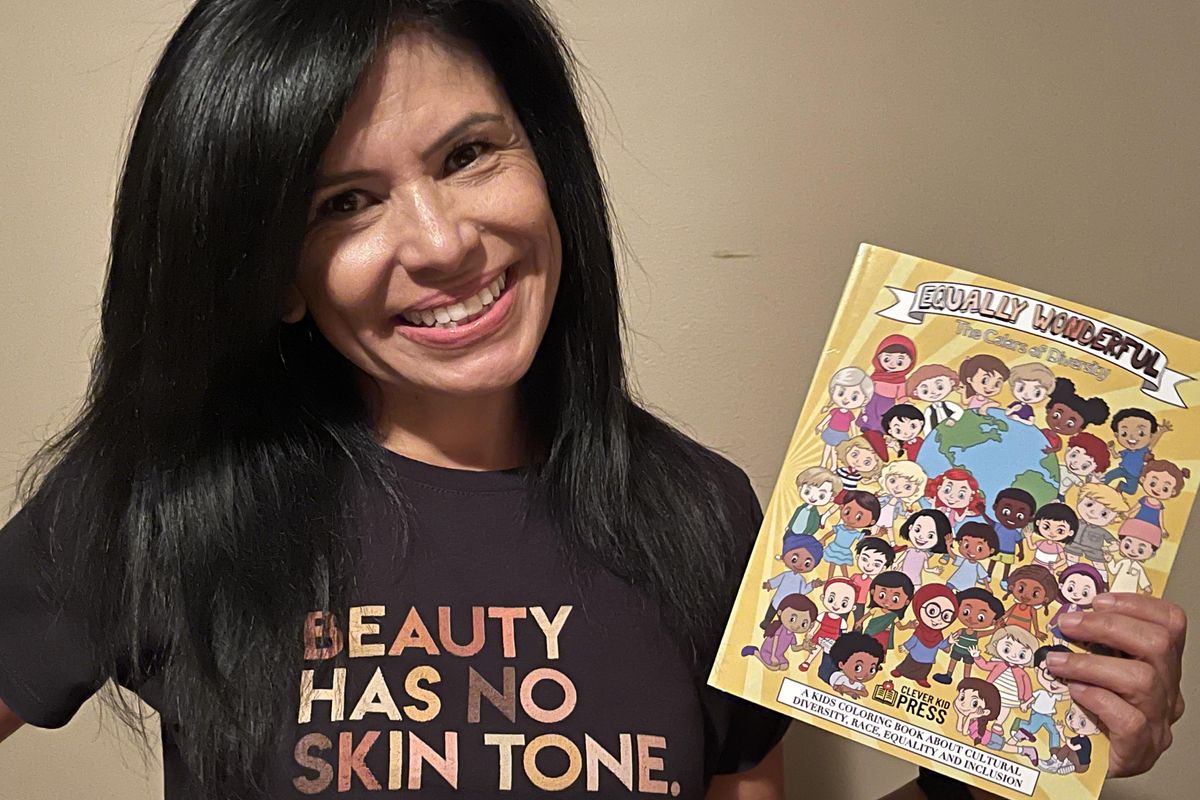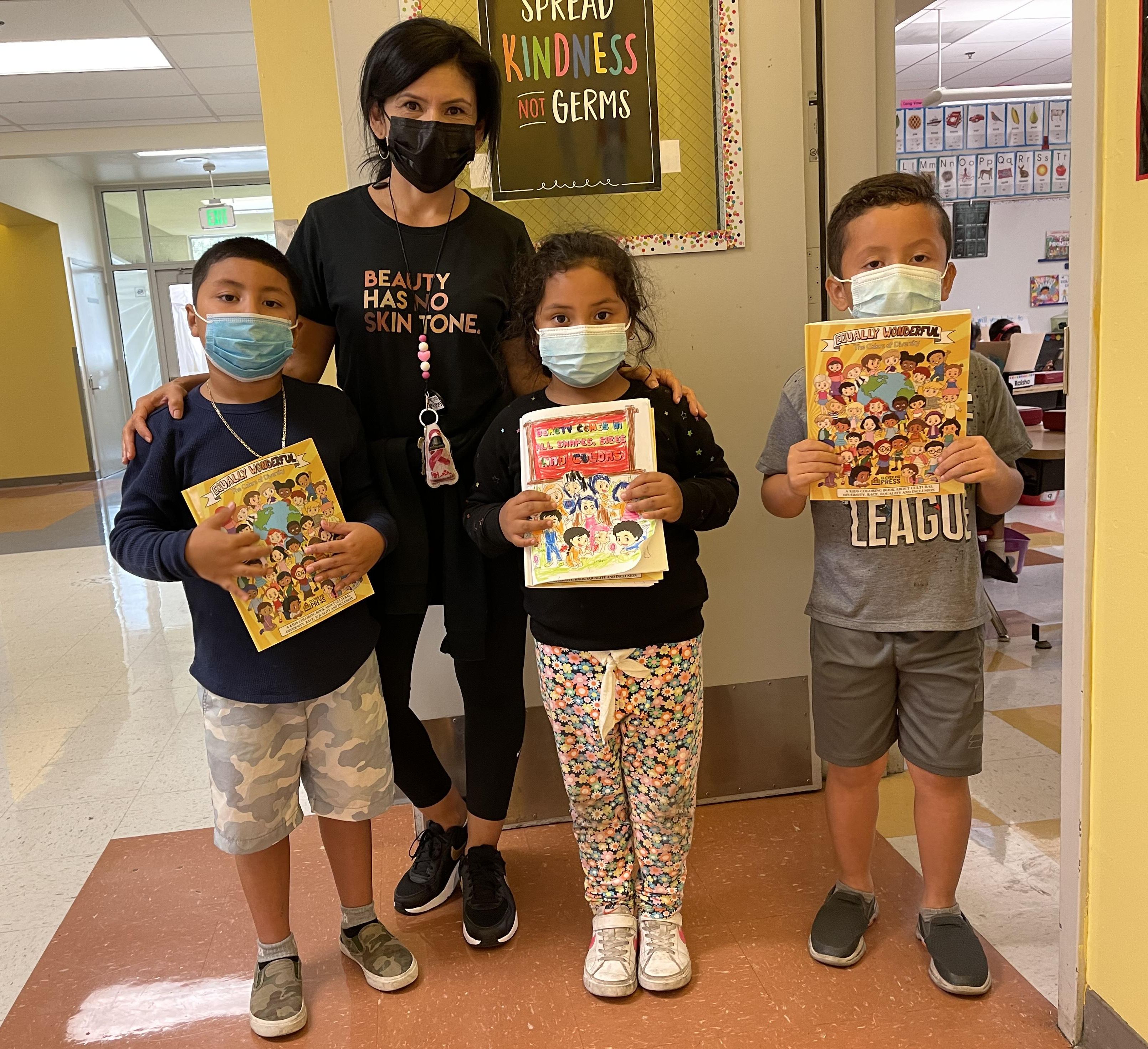This teacher is using inclusive coloring books to encourage acceptance in her classroom

Marcella Lopez didn't always want to be a teacher — but once she became one, she found her passion. That's why she's stayed in the profession for 23 years, spending the past 16 at her current school in Los Angeles, where she mostly teaches children of color.
"I wanted purpose, to give back, to live a life of public service, to light the spark in others to think critically and to be kind human beings," she says. "More importantly, I wanted my students to see themselves when they saw me, to believe they could do it too."
Ms. Lopez didn't encounter a teacher of color until college. "That moment was life-changing for me," she recalls. "It was the first time I felt comfortable in my own skin as a student. Always remembering how I felt in that college class many years ago has kept me grounded year after year."
It's also guided her teaching. Ms. Lopez says she always selects authors and characters that represent her students and celebrate other ethnicities so students can relate to what they read while also learning about other cultures.
"I want them to see themselves in the books they read, respect those that may not look like them and realize they may have lots in common with [other cultures] they read about," she says.
She also wants her students to have a different experience in school than she did.
When Ms. Lopez was in first grade, she "was speaking in Spanish to a new student, showing her where the restroom was when a staff member overheard our conversation and directed me to not speak in Spanish," she recalls. "In 'this school,' we only speak English," she remembers them saying. "From that day forward, I was made to feel less-than and embarrassed to speak the language of my family, my ancestors; the language I learned to speak first."
Part of her job, she says, is to find new ways to promote acceptance and inclusion in her classroom.
"The worldwide movement around social justice following the death of George Floyd amplified my duty as a teacher to learn how to discuss racial equity in a way that made sense to my little learners," she says. "It ignited me to help them see themselves in a positive light, to make our classroom family feel more inclusive, and make our classroom a safe place to have authentic conversations."
One way she did that was by raising money through DonorsChoose to purchase books and other materials for her classroom that feature diverse perspectives.

The Allstate Foundation recently partnered with DonorsChoose to create a Racial Justice and Representation category to encourage teachers like Ms. Lopez to create projects that address racial equity in the classroom. To launch the category, The Allstate Foundation matched all donations to these projects for a total of $1.5 million. Together, they hope to drive awareness and funding to projects that bring diversity, inclusion, and identity-affirming learning materials into classrooms across the country. You can see current projects seeking funding here.
When Ms. Lopez wanted to incorporate inclusive coloring books into her lesson plans, The Allstate Foundation fully funded her project so she was able to purchase them.
"I'm a lifelong learner, striving to be my best version of myself and always working to inspire my little learners to do the same," she says. Each week, Ms. Lopez and the students would focus on a page in the book and discuss its message. And she plans to do the same again this school year.
"DonorsChoose has been a gamechanger for my students. Without the support of all the donors that come together on this platform, we wouldn't have a sliver of what I've been able to provide for my students, especially during the pandemic," she says.
"My passion is to continue striving to be excellent, and to continue to find ways to use literature as an anchor, depicting images that reflect my students," she says.
To help teachers like Ms. Lopez drive this important mission forward, donate on DonorsChoose.

- Trevor Noah beautifully connects the dots to explain the current ... ›
- Black women are now America's most educated group. - Upworthy ›
- Student's response to a school assignment bravely challenges its ... ›
- African Goddess Rising Oracle deck is a must have - Upworthy ›
- A boy told his teacher she can't understand him because she's white. Her response is on point. - Upworthy ›
- A boy told his teacher she can't understand him because she's white. Her response is on point. - Upworthy ›
- Little girl rants about why things are 'man-made' - Upworthy ›

 I Love You Elf GIF by MOODMAN
I Love You Elf GIF by MOODMAN "Love you!" Oops.
"Love you!" Oops. Green Flag GIF by The Last Talk Show
Green Flag GIF by The Last Talk Show Embarrassed Hide GIF by flor
Embarrassed Hide GIF by flor Eating the right foods is crucial for mental health.
media3.giphy.com
Eating the right foods is crucial for mental health.
media3.giphy.com
 Legumes, like beans and lentils, are super foods and chockful of Vitamin B9.
Photo credit: Canva
Legumes, like beans and lentils, are super foods and chockful of Vitamin B9.
Photo credit: Canva
 Spending time in nature for at least two hours a week is great for overall wellbeing.
Spending time in nature for at least two hours a week is great for overall wellbeing.  There's an innate need for human connection.
There's an innate need for human connection. Even a simple hike, no matter what the pace, is effective when combatting feeling bad.
Even a simple hike, no matter what the pace, is effective when combatting feeling bad.  Tracking your steps can help motivate you and keep you motivated.
Tracking your steps can help motivate you and keep you motivated.  Vincent Van Gogh's Self-Portrait, 1889Image via
Vincent Van Gogh's Self-Portrait, 1889Image via  Turbulent flow illustrated and animated.
Turbulent flow illustrated and animated. Animation of art referencing science.
Animation of art referencing science. Animated Starry Night
Animated Starry Night An animated depiction of The Scream.
An animated depiction of The Scream.
There's a reason why some people can perfectly copy accents, and others can't
Turns out, there's a neurodivergent link.
A woman in black long sleeve shirt stands in front of mirror.
Have you ever had that friend who goes on vacation for four days to London and comes back with a full-on Queen's English posh accent? "Oooh I left my brolly in the loo," they say, and you respond, "But you're from Colorado!" Well, there are reasons they (and many of us) do that, and usually it's on a pretty subconscious level.
It's called "accent mirroring," and it's actually quite common with people who are neurodivergent, particularly those with ADHD (Attention Deficit Hyperactivity Disorder). According Neurolaunch, the self-described "Free Mental Health Library," "Accent mirroring, also known as accent adaptation or phonetic convergence, is the tendency to unconsciously adopt the accent or speech patterns of those around us. This linguistic chameleon effect is not unique to individuals with ADHD, but it appears to be more pronounced and frequent in this population."
Essentially, when people have conversations, we're constantly "scanning" for information—not just the words we're absorbing, but the inflection and tone. "When we hear an accent, our brains automatically analyze and categorize the phonetic features, prosody, and intonation patterns," writes Neurolaunch. For most, this does result in copying the accent of the person with whom we're speaking. But those with ADHD might be more sensitive to auditory cues. This, "coupled with a reduced ability to filter out or inhibit the impulse to mimic…could potentially explain the increased tendency for accent mirroring."
While the article explains further research is needed, they distinctly state that, "Accent mirroring in individuals with ADHD often manifests as an unconscious mimicry of accents in social situations. This can range from subtle shifts in pronunciation to more noticeable changes in intonation and speech rhythm. For example, a person with ADHD might find themselves unconsciously adopting a Southern drawl when conversing with someone from Texas, even if they’ve never lived in the South themselves."
People are having their say online. On the subreddit r/ADHDWomen, a thread began: "Taking on accents is an ADHD thing?" The OP shares, "My whole life, I've picked up accents. I, myself, never noticed, but everyone around me would be like, 'Why are you talking like that??' It could be after I watched a show or movie with an accent or after I've traveled somewhere with a different accent than my 'normal.'
They continue, "Apparently, I pick it up fast, but it fades out slowly. Today... I'm scrolling Instagram, I watch a reel from a comedian couple (Darcy and Jeremy. IYKYK) about how Darcy (ADHD) picks up accents everywhere they go. It's called ADHD Mirroring??? And it's another way of masking."
(The OP is referring to Darcy Michaels and his husband Jeremy Baer, who are both touring comedians based in Canada.)
Hundreds of people on the Reddit thread alone seem to relate. One comments, "Omfg I've done this my whole life; I'll even pick up on the pauses/spaces when I'm talking to someone who is ESL—but English is my first language lol."
Sometimes, it can be a real issue for those around the chameleon. "I accidentally mimicked a waitress's weird laugh one time. As soon as she was out of earshot, my family started to reprimand me, but I was already like 'oh my god I don’t know why I did that, I feel so bad.'"
Many commenters on TikTok were shocked to find out this can be a sign of ADHD. One jokes, "Omg, yes, at a store the cashier was talking to me and she was French. She's like 'Oh are you French too? No, I'm not lol. I'm very east coast Canada."
And some people just embrace it and make it work for them. "I mirror their words or phrase! I’m 30. I realized I start calling everyone sweetie cause my manager does & I work at coffee shop."